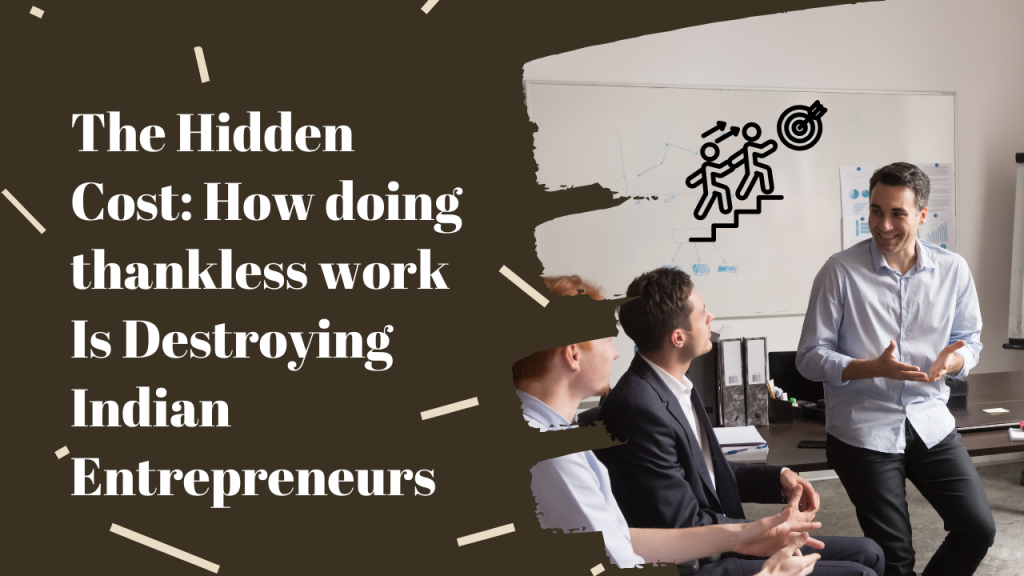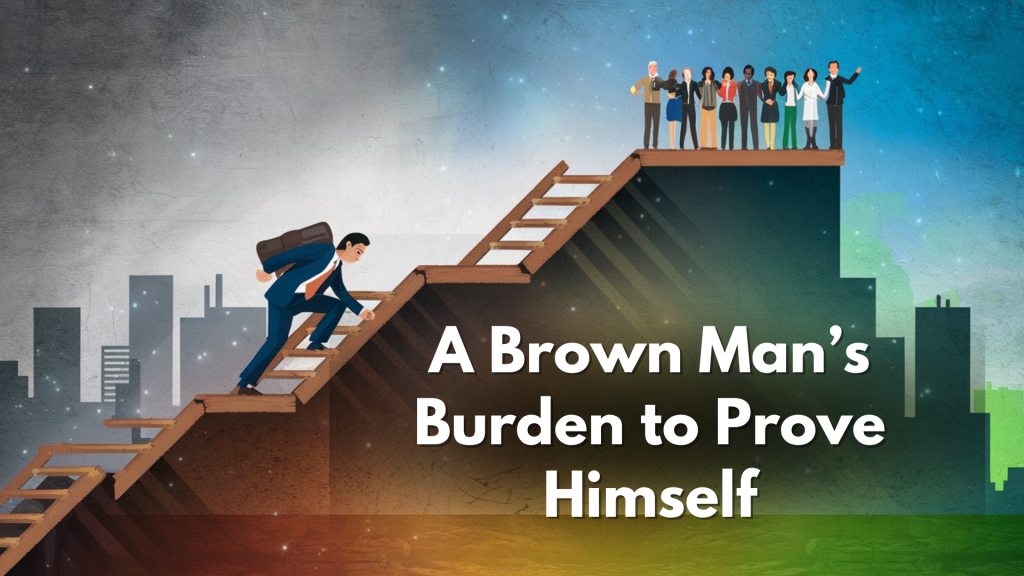
The Hidden Cost: How doing thankless work Is Destroying Indian Entrepreneurs
Many Indians hold the life of a solopreneur or entrepreneur in high esteem. Their contributions to society, the economy, and

Scene: A Boardroom in Singapore
Arjun Sinha adjusted his tie nervously as he waited for his turn to present. He was the only Indian on the team, and though he’d been with the company for five years, he still felt the unspoken scrutiny every time he entered a room dominated by Western colleagues.
“Next up, we have Arjun,” announced Emma, the team lead. “He’s put together a detailed analysis of our expansion strategy for the next quarter.”
As Arjun began his presentation, his confidence grew. He knew his data was solid, his projections realistic, and his insights valuable. But halfway through, he noticed James, a consultant from the UK, exchanging glances with Michael, an expat from Australia.
“Interesting,” James interrupted. “But I think the approach we used in London last year might be more applicable here. What do you think, Michael?”
Michael nodded. “Yes, I’d agree. We might need a more global perspective on this.”
The room buzzed with murmurs, and just like that, the attention shifted away from Arjun’s carefully crafted plan. His voice faltered. He could feel the weight of the room’s biases pressing down on him.
Scene: A Corporate Meeting Room in Dubai
Rohan Mehra, a seasoned IT professional from Mumbai, sat at the end of the long conference table. His presentation slides were crisp, his solutions well-researched, and his experience in managing global teams evident. Yet, as he spoke about streamlining processes for the multinational firm he worked for, he noticed it again, the subtle shift in the room.
The murmurs. The stolen glances between colleagues. The raised eyebrows of his manager, a British expat named Simon.
When Rohan concluded, Simon leaned forward, his voice neutral but cold.
“That’s an interesting approach, Rohan, but let’s wait for James to weigh in. He’s had experience in similar scenarios in Europe.”
James, a junior consultant from London, had been with the company for less than a year. His nod carried more weight in the room than Rohan’s decade of expertise.
The Silent Struggle
Rohan isn’t alone in his experience. Across Southeast Asia and the Middle East, where expatriates from all over the world converge, Indian professionals often find themselves grappling with an unspoken hierarchy.
An HR survey conducted in 2023 among professionals in the UAE revealed:
“It’s exhausting,” Rohan confided to a colleague after the meeting. “You do the work, you deliver the results, but you’re still seen as the guy who takes instructions, not the one who gives them.”
A Familiar Pattern
Arjun’s experience is not unique. Across Southeast Asia, Indian professionals often find themselves battling an unspoken hierarchy in workplaces dominated by expatriates from Europe, the UK, and the US.
“I’ve seen it countless times,” Arjun later confided to a colleague over coffee. “No matter how well-prepared you are, there’s this underlying assumption that a white voice carries more credibility. It’s not about merit; it’s about perception.”
The Bias Beneath the Surface
A 2022 survey conducted among professionals in Singapore, Malaysia, and Thailand revealed:
“Sometimes, it’s not over,” explained Priya, a marketing executive in Kuala Lumpur. “It’s in the way your contributions are second-guessed, or how a Western colleague’s idea often the same as yours, is hailed as groundbreaking.”
These subtle biases take a toll on professionals like Arjun.
Breaking Point
For Arjun, the turning point came during a critical client pitch. He had spent weeks preparing, but at the last minute, Emma asked James to lead the presentation.
“You know the clients prefer someone with global exposure,” she said, trying to soften the blow.
Arjun couldn’t hide his frustration. “Global exposure?” he challenged. “I’ve worked across three continents. I understand this market better than anyone in the room. What more do I need to prove?”
Emma hesitated, sensing the weight of his words. But the decision had already been made.
A Call for Change
Arjun’s story isn’t just about individual frustration, it’s a reflection of systemic issues that perpetuate workplace inequality.
1. The Perception Problem
Indian professionals are often stereotyped as excellent executors but not strategic thinkers. This bias, deeply ingrained in global corporate culture, diminishes their contributions.
2. The Hierarchical Mindset
In Southeast Asia, the legacy of colonialism lingers, with Western expatriates often occupying top positions, regardless of local talent availability.
3. Lack of Representation
The absence of South Asians in leadership roles perpetuates the cycle, leaving younger professionals without role models to aspire to.
Hope on the Horizon
Change, though slow, is possible. Organizations that prioritize diversity and inclusion can create environments where talent is recognized, regardless of nationality or ethnicity.
Steps Toward Equity
The Larger Picture
“A Brown Man’s Burden” isn’t just about individual struggles; it’s about systemic issues that perpetuate inequality. It’s a call to action for workplaces to truly embrace diversity, not just in numbers but in perspectives and leadership.
For Rohan and countless others, the burden to prove themselves is heavy. But with collective effort, the weight can be lifted, and workplaces can become places of true meritocracy.
As Rohan reflected after his meeting, “It’s not just about proving myself anymore. It’s about changing the narrative for everyone who comes after me.”
Scene: A New Beginning
A year later, Arjun found himself in a new role at a progressive firm that valued his expertise. During a strategy meeting, his new manager, Lina, encouraged him to lead a major project.
“I’ve read your past work, Arjun,” Lina said. “Your insights are exactly what we need. Take the lead on this.”
For the first time in years, Arjun felt seen not as an Indian professional trying to prove himself, but as a capable leader.
“I wish more companies could see talent for what it is,” he reflected. “Diversity isn’t just a checkbox; it’s what drives innovation and success.”
The Takeaway
The burden of proving oneself is a weight too many Indian professionals carry in Southeast Asia. But as workplaces evolve, stories like Arjun’s remind us of the importance of breaking down biases and fostering true meritocracy.
For every Arjun, there’s a lesson: Talent knows no borders, and it’s high time workplaces reflected that truth.
© Dr. Pratik P. SURANA (Ph.D.)
Quantum Group
#ABrownMansBurden #WorkplaceDiversity #LeadershipEquality #BreakTheBias #InclusionMatters

Many Indians hold the life of a solopreneur or entrepreneur in high esteem. Their contributions to society, the economy, and

Staying competitive, inventing new things, and achieving sustainable growth are constant goals for organizations in today’s interconnected and fast-paced global